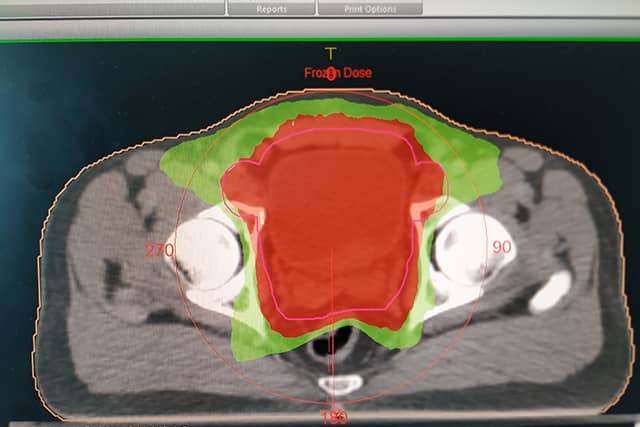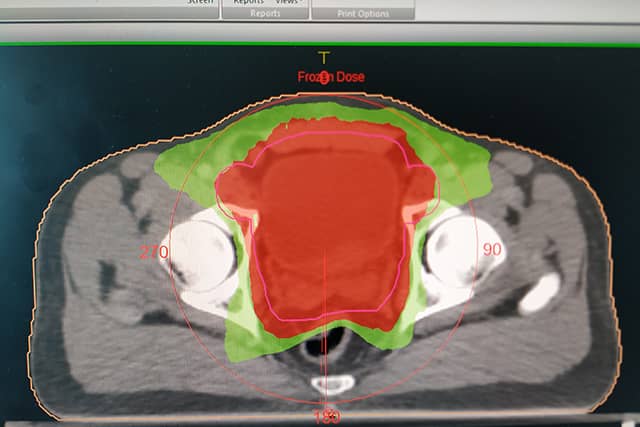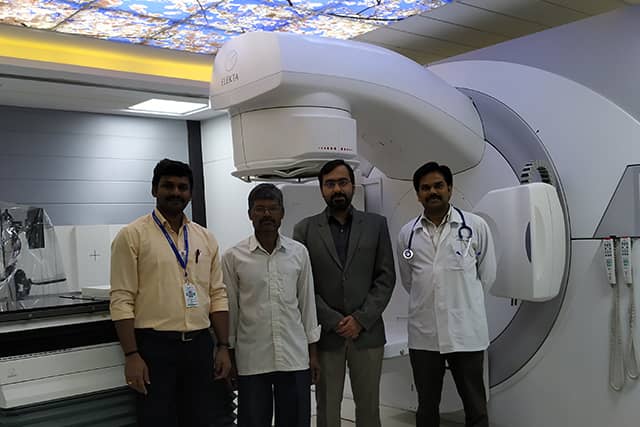Radiation Therapy- Urological Cancer
- Home
- Radiation Therapy- Urological Cancer





Radiation Therapy- Urological Cancer
60/M, Mr AS, was completely taken aghast when he was told that his age-related urinary symptoms could be related to cancer. What was more trouble-some was the fact that his blood reports and his biopsy were not matching. Mr AS had undergone cystoscopy and biopsy suggestive of prostate cancer. But surprisingly his PSA (blood reports) came to be in normal range. He chose to take Oncological opinion at OLCC, Satara.
Dr Karan Chanchlani, a Clinical Oncologist with special interest in Urological malignancies, found this a little odd, although possible. A PSMA PET scan dedicated for prostate cancers was done which didn’t pick up the desired uptake with Prostate-specific PSMA. Hence a complimentary FDG PET scan which is was done which was a game changer. It clearly showed a tumor arising from inside the Urinary Bladder going to the Prostate. A review of the outside biopsy slides confirmed that it was Transitional cell carcinoma, a cancer of the urinary bladder. Accordingly, his entire line of treatment changed. He was offered Bladder preservation protocol with Chemotherapy and Radiation therapy for Ca Urinary Bladder.
Today, 1 year after his treatment, Mr AS is completely symptom free with no urinary problems and an excellent Quality of Life (QoL). He has gone back to his routine life and works in his small farm. He spends a part of his day educating his village folks about cancer, its treatment and the ill-effects of tobacco. “My entire life has changed after this” says Mr AS. “I was fearful of the treatment especially Radiation and its side-effects. I was told that the other option was to surgically remove the urinary bladder which was a complex procedure and would had given me a permanent urinary diversion stoma bag and I would not had passed urine the natural way. Radiation allowed me to preserve my urinary bladder and still treat my cancer. Today, I am completely tumor free and passing urine naturally without and significant problems”, adds Mr AS.
Dr Karan is a Clinical and Radiation Oncologist with special interest in urological cancers. He currently heads the Department of Radiation Oncology at Oncolife Cancer Centre, Satara. “Urological malignancies are a complex spectrum of tumors arising from the urinary tract from kidneys to urethra. Each site or organ has a different tumor type and behaviour. Surgery was the predominant treatment modality hitherto. However with latest advances in Radiation techniques and chemotherapy drugs along with modern imaging facilities like PET scan, the treatment paradigm of these tumors has changed. Today, a significant proportion of Bladder cancer patients are eligible for “Bladder preservation”. He further adds “with modern radiation techniques highly focussed Radiation is delivered to the desired target volumes (tumor) leading to improved tumor control and lesser side-effects. There is an proven improvement in outcomes using modern techniques like “IGRT” (Image Guided RT) and “Plan of the Day’, in which various plans of Radiation are made for the same patient and a quick simple CT scan is done before each session of radiation. The plan that best suits the bladder filling and location of the tumor on that given day, is used for treating the patient. This helps in minimising the side effects of radiation thereby improving outcomes”.
Having trained in few of the finest institutes of the country like PGI Chandigarh and Tata Memorial Hospital, Dr Karan Chanchlani is the pioneer of this technique in Satara. “Organ preservation without compromising tumor control is the new norm of treatment of urinary bladder cancers” adds Dr Karan.
